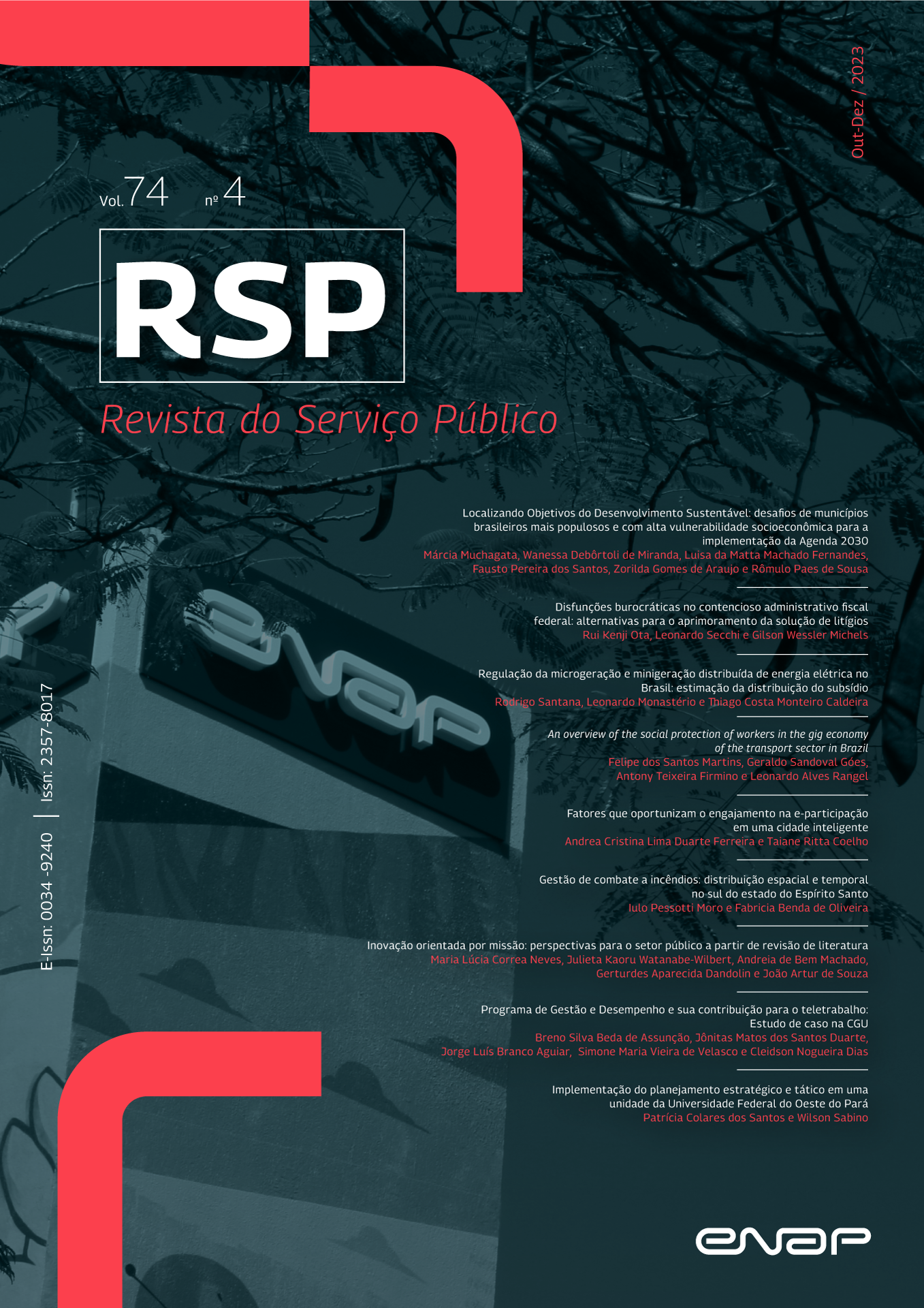Factores que fomentan la participación electrónica en una ciudad inteligente
DOI:
https://doi.org/10.21874/rsp.v74i4.10019Palabras clave:
plataforma de participacíon eletrónica, compromiso, ciudades inteligentesResumen
Este artículo tiene como objetivo demostrar los principales factores que contribuyen a la expansión de la participación ciudadana y el compromiso, en los procesos de participación electrónica (e-participación), en una ciudad inteligente. Las ciudades inteligentes son aquellas que utilizan la inteligencia como una acción continua en la que el gobierno, los ciudadanos y otras partes interesadas piensan e implementan iniciativas, que buscan hacer de una ciudad, un lugar mejor para vivir. Partiendo de este contexto, se realizó un estudio de caso de la Plataforma Fala Curitiba, en el Ayuntamiento de Curitiba, empleando los siguientes métodos de investigación: entrevista, investigación documental, consulta de bases de datos y, por último, análisis de contenido. Sus principales resultados demuestran los factores que posibilitan la expansión de la participación y el compromiso ciudadano en los procesos de e-participación, que son informativos, institucionales, motivacionales, tecnológicos y culturales.
Descargas
Citas
AICHHOLZER, G.; ALLHUTTER, D. On-line forms of political participation and their impact on democracy. Institute of Technology Assessment (ITA). Vienna, 2011.
ALARABIAT, A.; SOARES, D.; ESTEVEZ, E. Determinants of citizens’ intention to engage in government-led electronic participation initiatives through Facebook. Government Information Quarterly, v. 38, n. 1, p. 101537, Jan. 2021. https://doi.org/10.1016/j.giq.2020.101537
CABRAL, L. N.; CÂNDIDO, G. A. Urbanização, vulnerabilidade, resiliência: relações conceituais e compreensões de causa e efeito. Urbe. Revista Brasileira de Gestão Urbana, on-line, v.11, n. 3, p. 1-13, fev. 2019. Disponível em: https://www.scielo.br/j/urbe/a/b6W57J68KwHWXbbHRGvG8Gg/abstract/?lang=pt. Acesso em: 01 mai. 2020. https://doi.org/10.1590/2175-3369.011.002.AO08
CANTADOR, I.; CORTÉS-CEDIEL, M. E.; FERNÁNDEZ, M. Exploiting Open Data to analyze discussion and controversy in online citizen participation. Information Processing & Management, v. 57, n. 5, p. 102301, Sep. 2020. https://doi.org/10.1016/j.ipm.2020.102301
CARVALHO, S. M. S., MARTIN, A. R., CARNEIRO, A. G., SANTOS, E. R., & BARBOSA, A. P. T. (2020) Smart Cities: avaliação das características dos ecossistemas de inovação de duas cidades inteligentes brasileiras. Cadernos de Prospecção – Salvador, v. 13, n. 3, p. 693-706, junho, 2020. https://doi.org/10.9771/cp.v13i3.32928
CHARALABIDIS, Y.S.K. ICT for Governance and Policy Modelling: visionary Directions and Research Paths. Empowering Open and Collaborative Governance. Springer, Berlin Heidelberg, p. 263-282, Apr. 2012. https://doi.org/10.1007/978-3-642-27219-6_14
COELHO, T. R. Análise de poder nas plataformas de participação digital e a influência em políticas públicas. 2018. Disponível em: https://bibliotecadigital.fgv.br/dspace/handle/10438/20285. Acesso em: 6 mai. 2023.
COELHO, T. R.; CUNHA, M. A.; POZZEBON, M. eParticipation practices and mechanisms of influence: An investigation of public policymaking. Government Information Quarterly, v. 39, n. 2, p. 101667, Apr. 2022. https://doi.org/10.1016/j.giq.2021.101667
CROPF, R. A.; BENTON, M. Towards a working model of e-participation in smart cities: what the research suggests, v. 34, p. 99-121, Aug. 2019.
CUNHA, M. A.; PRZEYBILOVICZ, E.; MACAYA, J. F. M.; BURGOS, F. Smart cities: transformação digital de cidades. 1. Ed. São Paulo: Editor Programa Gestão Pública e Cidadania – PGPC, 2016.
CURITIBA. Prefeitura Municipal de Curitiba (PMC). Relação das áreas territoriais denominadas Regionais. Disponível em: https://curitiba.pr.gov.br. Acesso em: 25 abril 2021.
DUDZIAK, E. A.; FERREIRA, S. M. S. P.; FERRARI, A. C. Competência informacional e midiática: uma revisão dos principais marcos políticos expressos por declarações e documentos. Pesquisa Brasileira em Ciência da Informação e Biblioteconomia, v. 12, n. 2, 19 out. 2017.
EFFING, R.; GROOT, B.P. Social Smart City: Introducing Digital and Social Strategies for Participatory Governance in Smart Cities. In: Conference International Conference on Electronic Government and the Information Systems Perspective, 241-252, Aug. 2016. https://doi.org/10.1007/978-3-319-44421-5_19
GIL, O.; CORTÉS-CEDIEL, M. E.; CANTADOR, I. Citizen Participation and the Rise of Digital Media Platforms in Smart Governance and Smart Cities. International Journal of E-Planning Research, v. 8, n. 1, p. 19–34, Jan. 2019. https://doi.org/10.4018/IJEPR.2019010102
IBGE. Portal do IBGE. Indicadores Demográficos 2021. Disponível em: https://www.ibge.gov.br/ Acesso em: 20 jul. 2021.
JIANG, J.; MENG, T.; ZHANG, Q. From Internet to social safety net: The policy consequences of online participation in China. Governance, v. 32, n. 3, p. 531–546, 19 Feb. 2019. https://doi.org/10.1111/gove.12391
JHO, W.; SONG, K. J. Institutional and technological determinants of civil e-Participation: Solo or duet? Government Information Quarterly, v. 32, n. 4, p. 488–495, Oct. 2015. https://doi.org/10.1016/j.giq.2015.09.003
LIEVEN, C. DIPAS – Towards an integrated GIS-based system for civic participation. Procedia Computer Science, v. 112, p. 2473–2485, 2017. https://doi.org/10.1016/j.procs.2017.08.182
MANDA, M. I.; BACKHOUSE, J. Smart governance for inclusive socio-
economic transformation in South Africa: are we there yet? Springer, p. 179-201, Jan. 2019. https://doi.org/10.1007/978-3-319-89474-4_9
MEDAGLIA, R. eParticipation research: Moving characterization forward (2006–2011). Government Information Quarterly, v. 29, n. 3, p. 346–360, Jul. 2012. https://doi.org/10.1016/j.giq.2012.02.010
MATOS BERNARDO, M. DO R. Smart Governance in european smart cities. In: 14th Iberian Conference on Information Systems and Technologies (CISTI), Coimbra, Portugal, p. 1-6, jul. 2019. Disponível em: https://ieeexplore.ieee.org/document/8760953. Acesso em: 6 mai. 2023. https://doi.org/10.23919/CISTI.2019.8760953
MEIJER, A.; BOLÍVAR, M. P. R. Governing the smart city: a review of the literature on smart urban governance. International Review of Administrative Sciences, v. 82, n. 2, p. 392–408, 29 abr. 2015. https://doi.org/10.1177/0020852314564308
MILES, M. B.; HUBERMAN, A.M. Qualitative data analysis an expanded sourcebook. 2nd. ed. Thousand Oaks: Sage, 1994.
NAM, T.; PARDO, T. A. Conceptualizing Smart City with Dimensions of Technology, People, and Institutions. In: 12th Annual International Conference on Digital Government Research. Proceedings of…New York: University at Albani (CTG), p. 282-291, jun. 2011. Disponível em: http://www.ctg.albany.edu/publications/journals/dgo_2011_smartcity/dgo_2011_smartcity.pdf. Acesso em: 10 maio, 2021. https://doi.org/10.1145/2037556.2037602
NARANJO-ZOLOTOV, M.; OLIVEIRA, T.; CASTELEYN, S. Citizens’ intention to use and recommend e-participation. Information Technology & People, v. 32, n. 2, p. 364–386, 14 Aug. 2018. https://doi.org/10.1108/ITP-08-2017-0257
OECD. Citizens as partners information, consultation and public participation in policy-making. [s.l.] OECD Publishing, 2001. https://doi.org/10.1787/9789264195561-en
PINHO, J. A. G. (org). Estado, sociedade e interações digitais: expectativas democráticas. Salvador: Edufba.192p. 2012.
RODRIGUEZ-BOLÍVAR, M. P.; MUÑOZ, L. A. E-Participation in smart cities: technologies and models of governance for citizen engagement. Cham, Switzerland: Springer Nature, v. 34, 2019.
ROYO, S.; YETANO, A. “Crowdsourcing” como ferramenta de e-participação: duas experiências sobre emissões de CO2 a nível municipal. Pesquisa em Comércio Eletrônico, v. 15, n. 3, p. 323-348, 2015.
SÆBØ, Ø.; ROSE, J.; SKIFTENES FLAK, L. The shape of e-Participation: Characterizing an emerging research area. Government Information Quarterly, v. 25, n. 3, p. 400–428, Jul. 2008. https://doi.org/10.1016/j.giq.2007.04.007
SÆBØ, Ø.; ROSE, J.; MOLKA-DANIELSEN, J. E-Participation: Designing and Managing Political Discussion Forums. Social Science Computer Review, v. 28, n. 4, p. 403–426, Nov. 2010. Disponível em: https://www.researchgate.net/publication/235721815_eParticipation_Designing_and_Managing_Political_Discussion_Forums. Acesso em: 10 julho 2020. https://doi.org/10.1177/0894439309341626
SAMPAIO, R. C. E-Orçamentos Participativos como iniciativas de e-solicitação: uma prospecção dos principais casos e reflexões sobre a e-Participação. Revista de Administração Pública, v. 50, n. 6, p. 937–958, dez. 2016. https://doi.org/10.1590/0034-7612152210
STRATU-STRELET, D.; GIL-GÓMEZ, H; OLTRA-BADENES, R.; OLTRA-GUTIERREZ, J. V. Critical factors in the institutionalization of e-participation in e-government in Europe: Technology or leadership? Technological Forecasting and Social Change, v. 164, p. 120489, mar. 2021. https://doi.org/10.1016/j.techfore.2020.120489
TOMOR, Z.; MEIJER, A.; MICHELS, A.; GEERTMAN. Smart Governance for Sustainable Cities: Findings from a Systematic Literature Review. Journal of Urban Technology, v. 26, n. 4, p. 3–27, Oct. 2019. https://doi.org/10.1080/10630732.2019.1651178
VÁZQUEZ, N.A.; VICENTE, M.R. Exploring the determinants of e-participation in smart cities. In: E-Participation in Smart Cities: Technologies and Models of Governance for Citizen Engagement. Springer International Publishing AG: Cham, Switzerland, v. 34, p. 157-178, Jan. 2019. https://doi.org/10.1007/978-3-319-89474-4_8
VERBA, S.; SCHLOZMAN, K.L.; BRADY, H. E. Voice and equality: civic voluntarism in American politics. Cambridge, Mass.: Harvard University Press, 1995. https://doi.org/10.2307/j.ctv1pnc1k7
VOORBERG, W. H.; BEKKERS, V. J. J. M.; TUMMERS, L. G. A Systematic Review of Co-Creation and Co-Production: Embarking on the social innovation journey. Public Management Review, v. 17, n. 9, p. 1333–1357, Jun. 2014. https://doi.org/10.1080/14719037.2014.930505
Descargas
Publicado
Cómo citar
Número
Sección
Licencia
Derechos de autor 2023 Revista do Serviço Público

Esta obra está bajo una licencia internacional Creative Commons Atribución-NoComercial-CompartirIgual 4.0.
- A RSP adota a licença Creative Commons (CC) do tipo Atribuição – Uso Não-Comercial (BY-NC).
- A licença permite que outros remixem, adaptem e criem obra licenciada, sendo proibido o uso com fins comerciais.
- As novas obras devem fazer referência ao autor nos créditos e não podem ser usadas com fins comerciais, porém não precisam ser licenciadas sob os mesmos termos dessa licença.
- Ao publicar o artigo na RSP, o autor cede e transfere para a ENAP os direitos autorais patrimoniais referentes ao artigo.
- O artigo publicado na RSP não poderá ser divulgado em outro meio sem a devida referência à publicação de origem.
- O autor que tiver o artigo publicado na RSP deverá assinar o Termo de Concessão de Direitos Autorais (em momento oportuno a editoria da Revista entrará em contato com o autor para assinatura do Termo).



